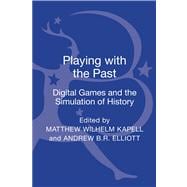Game Studies is a rapidly growing area of contemporary scholarship, yet volumes in the area have tended to focus on more general issues. With Playing with the Past, game studies is taken to the next level by offering a specific and detailed analysis of one area of digital game play -- the representation of history. The collection focuses on the ways in which gamers engage with, play with, recreate, subvert, reverse and direct the historical past, and what effect this has on the ways in which we go about constructing the present or imagining a future.
What can World War Two strategy games teach us about the reality of this complex and multifaceted period? Do the possibilities of playing with the past change the way we understand history? If we embody a colonialist's perspective to conquer 'primitive' tribes in Colonization, does this privilege a distinct way of viewing history as benevolent intervention over imperialist expansion? The fusion of these two fields allows the editors to pose new questions about the ways in which gamers interact with their game worlds. Drawing these threads together, the collection concludes by asking whether digital games - which represent history or historical change - alter the way we, today, understand history itself.








